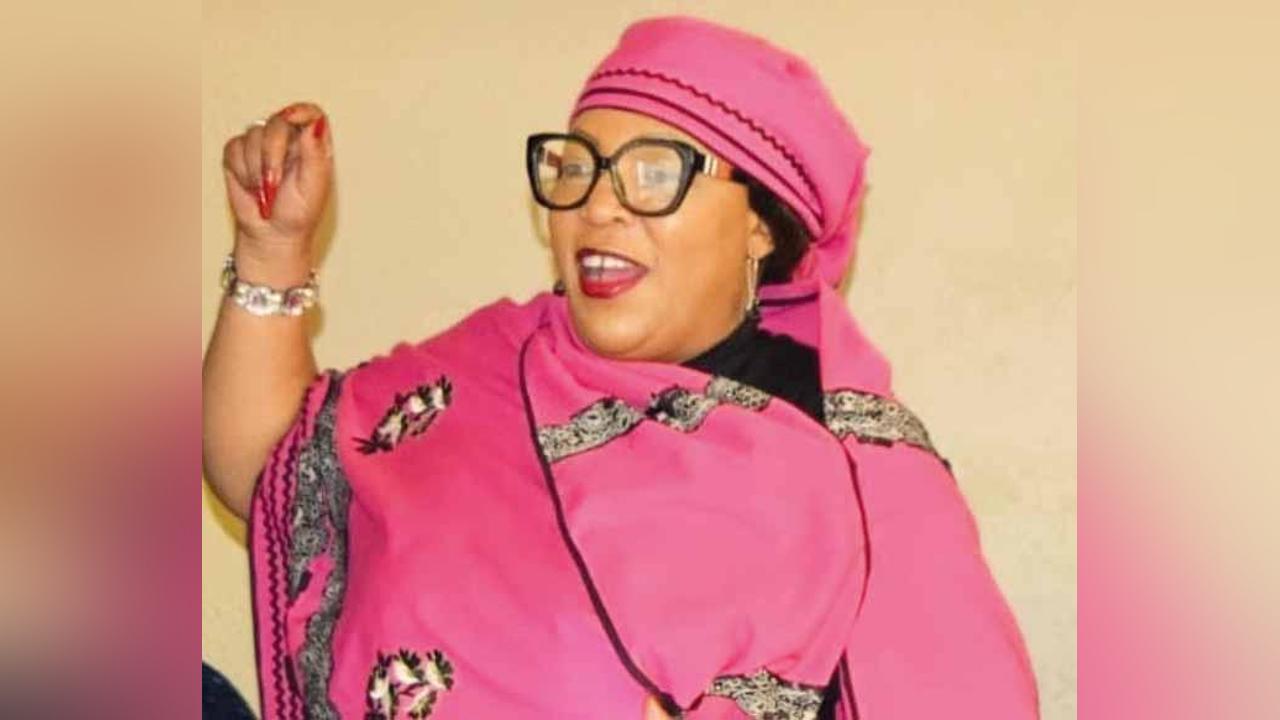Africa-Press – Lesotho. A 13-year-old Semonkong girl is tricked into a marriage with a young man aged 21. Her mother weeps and longs to be reunited with her daughter. In comes the police, and she is filled with hope that the perpetrators would be arrested, and she would get her daughter back in accordance with the law.
But she gets the shock of her life. Instead of enforcing the law and charging the perpetrators as per their mandate, the Semonkong police decide to negotiate.
In a disturbing turn of events, the police in Semonkong on Wednesday last week brought families together for talks, a move the girl’s mother describes as an attempt to subvert the law.
“I do not have money to hire a lawyer and I don’t know what to do anymore to bring her back,” she told thepost. thepost has decided to refrain from publishing the names of the girl and her mother to protect their identities.
The girl eloped with the 21-year-old Lekhafola Tšele to his village of Marakabei, a day-long journey on foot from her village. The girl is in Grade 7 at a local primary school.
Her 42-year-old mother says her daughter eloped a month ago but relatives whom the girl had visited deliberately delayed informing her of the development. She says her daughter left home with a close relative but was in the dark about the planned illegal marriage.
“They hid from me information that my daughter had eloped,” the mother said tearfully, adding that some elderly people were behind the plot to marry her daughter despite her tender age.
“It was my unbending belief that she was in a safe place at her uncle’s home,” she said.
According to the mother of three, the relatives whom the girl had visited were informed that she had eloped, and they did not have any qualms about it.
The woman, a widow, said her relatives sealed a deal with the family that her daughter eloped to without informing her. “When I demanded answers about the issue, I did not get any explanations.
Instead, I was hurled with insults,” she said. Faced with such a difficult situation, she approached the police for intervention. She said the police summoned the two families for talks on Wednesday last week and the family of the man failed to turn up for the meeting.
“I was insulted together with my son who did not support this from the beginning,” said the desperate mother.
The other murky part of the story is that the family that accepted the girl as their bride gave a different version when asked about his date of birth when they later agreed to go to the police.
“They flatly denied giving the man’s age before the police. They said they did not know it,” the girl’s mother said. On the day of the talks at the Semonkong police, the woman was given back her daughter, but the reunion did not last long.
On the way back to their village, the girl disappeared and wormed her way back to the family where she had eloped to. Now the woman is desperate and frustrated to get her child back again.
She said her husband died in 2006 and she has been struggling to raise their children as a single parent. Because she is poor, the girl’s mother said it is an uphill battle for her to fight the case in court.
To put bread on the table, she does piece jobs such as laundry at people’s homes. The woman says she also does not know what steps to take to seek legal intervention in the matter.
She said she is desperate to see her daughter furthering her studies and become a top fashion designer or a hairdresser and help provide for the family.
“Now my dreams about my daughter have been shattered by the early marriage,” she lamented. Phahameng Tšele, the father of the 21-year-old man at the centre of the scandal, claims he has just “learnt that the girl is still underage”.
He says the two families went to the police to give the girl back to her parents, but she returned back to his home. “I handed her over to her parents in front of the police, but she came back,” he said.
“What should I do now?” Tšele asked.
The Children’s Protection and Welfare Act states that a “child is in need of care and protection if the child has been or there is substantial risk that the child will be physically, psychologically or emotionally injured or sexually abused”.
It states that a police officer, the Department of Social Welfare, a chief or member of the community who is satisfied on reasonable grounds that a child is in need of care and protection may take the child and place him or her in a place of safety.
If a member of the community is of the opinion that a child is physically, psychologically or emotionally injured as a result of being ill-treated or neglected, abandoned or exposed to intoxication or is sexually abused, they shall immediately inform a chief, police or the Department of Social Welfare. A member of the community who fails to comply with the law is considered to have committed an offence and could be sentenced to community service.
The law also states that a person, parent or guardian who does not have lawful custody of a child and takes a child, without appropriate consent, whether within or outside Lesotho, commits an offence and is liable, upon conviction, to a fine not exceeding M10 000 or to imprisonment for a period not exceeding 10 months or both.
A person has lawful custody of a child under this section if he or she has been conferred custody of the child by virtue of any written law or by an order of the Children’s Court.
The girl’s relatives who allowed her elopement, the 21-year-old Lekhafola Tšele, and his parents who received the child as their daughter-in-law until the mother sought police intervention, could fall foul of the law.
Police deputy spokesperson, Inspector ’Mareabetsoe Mofoka, said it is illegal for a 13-year-old girl to get married. “All those who are behind this marriage should be dragged to the courts to account for this,” Inspector Mofoka said, without committing that there will be arrests.
She also did not say why the police have not arrested the perpetrators. Inspector Mofoka says they once experienced such a case in Thaba-Tseka “some years ago”.
The president of Ifo Lapeng, a women’s social home-building movement, Rebecca Makhalemele condemned child marriages, saying such arrangements compromise the future of a girl child.
“This is against the law,” Makhalemele said, adding that legal steps have to be taken against those in breach of the law.
Makhalemele promised to investigate the case of the13-year-old Semonkong girl. “We are going to follow up on this. We are going to work on it to its finality,” Makhalemele said.
The Executive Director of Women and Law in Southern Africa (WLSA), Advocate Libakiso Matlho, also criticised the development. “For the child to enter into marriage at the age below 18-years-old is totally wrong.
It is unlawful,” Advocate Matlho said. Advocate Matlho says there are a lot of social factors that lead to child marriages that include but are not limited to peer pressure.
“It is a sensitive issue,” she said.
In this case, she says the girl would have wanted to go back to her so-called “husband” because she thinks she might be a laughingstock and viewed as a failure for returning home and being out of “wedlock”.
Also, she might have fallen pregnant as she had stayed with the man for a month. On occasions like this one, the girl should receive counselling to help her through this trauma, said Advocate Matlho.
Advocate Matlho says the girl’s family should institute criminal proceedings against the family of the young man. “It boggles my mind why the girl has spent so much time in that marriage,” she said.
Adolescent Health Manager at the Ministry of Health, ’Mathato Nkuatsana, described the girl as a high-risk client because of her age. Nkuatsana said there are both social and health issues that have to be considered regarding the case, including issues of safety of the baby if the girl has fallen pregnant.
“This case has to be handled with great care because it involves a minor,” she said, adding that the girl might be going through serious trauma and needs counselling to make her understand that she is still part of the community.
“At the moment, she might be dealing with issues of rejection by her peers and the community at large. She is considered married and not part of adolescents,” Nkuatsana said. Because she is still a child, pregnancy could have far-reaching consequences.
“Her body is not ready to conceive a child,” Nkuatsana warned, adding that the girl will need close monitoring. Under the Marriage Act 1974, the minimum legal age of marriage is 18-years for boys and 16-years for girls.
However, under Article 27 both boys and girls can be married before the ages of 18 and 16 years respectively with the permission of the Minister of Home Affairs and with parental consent.
Contracting a marriage under civil law requires free consent of the parties under this Act. Under customary law, the man is obliged to exchange bohali (bride price) for a marriage to be valid. A UNICEF study published in 2021 says in Lesotho, nearly one in five girls marries before the age of 18 (19.4 percent in 2018).
UNICEF says that as with unintended adolescent pregnancy, rates of marriage are higher among girls in rural areas (24.9 percent vs 13.8 percent urban) and among those who are the poorest and have the lowest levels of schooling.
For More News And Analysis About Lesotho Follow Africa-Press






